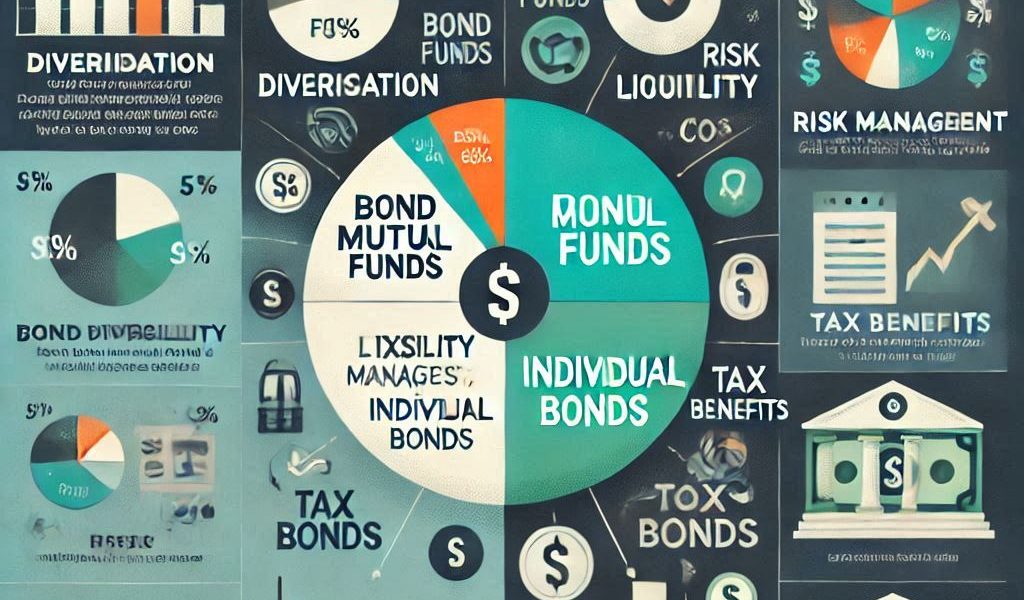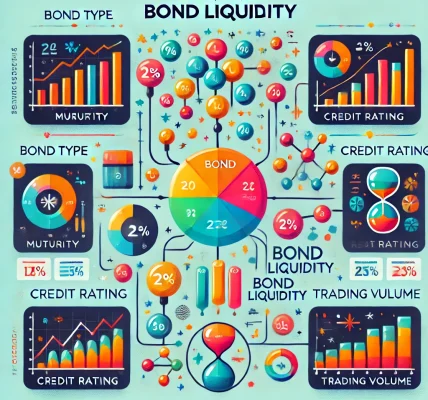When it comes to investing in bonds, you have two main options: bond mutual funds and individual bonds. Both of these investment vehicles offer distinct advantages and disadvantages depending on your financial goals, risk tolerance, and investment strategy. In this blog, we’ll compare bond mutual funds and individual bonds in terms of their structure, benefits, risks, and tax implications, helping you decide which option is best suited for your portfolio.
What Are Bond Mutual Funds?
Bond mutual funds are investment vehicles that pool money from multiple investors to purchase a diversified portfolio of bonds. These funds can include a variety of bond types, including corporate bonds, government bonds, and municipal bonds. The fund is managed by a professional portfolio manager who makes decisions about buying and selling bonds to achieve the fund’s objectives.
Key Features of Bond Mutual Funds:
- Diversification: Bond mutual funds typically hold a wide range of bonds, offering instant diversification.
- Professional Management: Fund managers actively manage the portfolio to meet the fund’s investment goals.
- Liquidity: Investors can buy or sell shares of the fund on any business day at the fund’s net asset value (NAV).
- Income Distribution: Most bond funds distribute the interest income to shareholders monthly or quarterly.
What Are Individual Bonds?
An individual bond is a debt security issued by a corporation, municipality, or government entity. When you purchase an individual bond, you are lending money to the issuer in exchange for regular interest payments and the return of your principal at maturity.
Key Features of Individual Bonds:
- Fixed Interest Payments: Bonds typically pay a fixed interest rate (coupon) at regular intervals, such as semi-annually.
- Maturity Date: Individual bonds have a specific maturity date when the principal (face value) is returned to the investor.
- Control Over Holdings: As a bondholder, you can choose specific bonds based on your risk preferences and goals.
- Potential for Capital Gains or Losses: If you sell a bond before it matures, its price may be higher or lower than its purchase price, resulting in a capital gain or loss.
Bond Mutual Funds vs. Individual Bonds: A Comparison
Now that we have a basic understanding of both bond mutual funds and individual bonds, let’s dive deeper into a side-by-side comparison to help you make an informed decision.
1. Diversification
Bond Mutual Funds:
- Bond mutual funds provide instant diversification. With a single investment, you get exposure to a variety of bonds across different sectors, issuers, and maturities. This helps to reduce risk by spreading your investment across multiple securities.
Individual Bonds:
- Purchasing individual bonds means you are exposed to the risk associated with a single issuer. While you can diversify by buying bonds from various issuers, it requires more capital and effort. Additionally, you won’t achieve the same level of diversification as a bond mutual fund with just a few individual bonds.
Winner: Bond Mutual Funds – for automatic diversification.
2. Risk Management
Bond Mutual Funds:
- Bond mutual funds are actively managed by professional fund managers, who can adjust the portfolio in response to changing market conditions. They can buy and sell bonds to manage interest rate risk, credit risk, and other factors, providing more flexibility to mitigate risk.
Individual Bonds:
- With individual bonds, you bear the risk of the issuer defaulting on interest payments or not being able to repay the principal. Additionally, the bond’s price can fluctuate due to changes in interest rates or the financial health of the issuer. If you hold a bond to maturity, the default risk is minimized, but price fluctuations still exist.
Winner: Bond Mutual Funds – for professional management and flexibility.
3. Liquidity
Bond Mutual Funds:
- Bond mutual funds offer high liquidity. You can buy or sell shares of the fund at the end of the trading day at its net asset value (NAV). This allows for easy access to your funds, as you don’t need to worry about finding a buyer or seller for your bonds.
Individual Bonds:
- Liquidity can be a challenge with individual bonds. Selling an individual bond before maturity may be difficult, especially if it is a less liquid bond (such as a corporate bond). The price at which you sell may also vary depending on market conditions and the bond’s characteristics.
Winner: Bond Mutual Funds – for ease of liquidity.
4. Income and Tax Efficiency
Bond Mutual Funds:
- Bond mutual funds distribute interest income to shareholders, typically on a monthly or quarterly basis. However, income from these funds is generally taxable at the federal level, and if you hold bonds in a taxable account, it can also be subject to state and local taxes. Municipal bond funds may offer some tax advantages for those in higher tax brackets.
Individual Bonds:
- With individual bonds, you receive regular interest payments directly from the issuer. If you invest in municipal bonds, you can receive tax-free interest income at the federal level (and possibly at the state and local levels, depending on where you live). Additionally, holding bonds to maturity eliminates the need to worry about ongoing tax implications on income, making them tax-efficient in certain circumstances.
Winner: Individual Bonds – for tax-free income with municipal bonds.
5. Cost
Bond Mutual Funds:
- Bond mutual funds typically charge management fees (expense ratios), which can range from 0.1% to 1% or more, depending on the fund. These fees are deducted from the fund’s assets, which can reduce your overall returns.
Individual Bonds:
- There are generally no ongoing fees with individual bonds. However, you may incur transaction costs when purchasing bonds through a broker or dealer. Additionally, buying individual bonds may require a larger initial investment to achieve adequate diversification.
Winner: Individual Bonds – for lower ongoing costs.
6. Customization
Bond Mutual Funds:
- Bond mutual funds offer little customization. You are investing in a pre-built portfolio of bonds, and you don’t have control over the specific bonds included in the fund. This can be an advantage if you prefer a hands-off approach, but a disadvantage if you want more control over your investments.
Individual Bonds:
- With individual bonds, you have complete control over your bond selection. You can tailor your bond investments based on factors like credit rating, maturity date, yield, and issuer. This allows for more personalized investment strategies.
Winner: Individual Bonds – for control and customization.
Which One Should You Choose?
Both bond mutual funds and individual bonds have their place in an investment portfolio, and the right choice depends on your specific financial goals, risk tolerance, and investment preferences.
- Choose Bond Mutual Funds if you want instant diversification, professional management, ease of liquidity, and the convenience of not having to actively manage individual bonds.
- Choose Individual Bonds if you want control over your bond investments, prefer to hold bonds to maturity for predictable income, and are looking for tax-efficient strategies (especially if you invest in municipal bonds).
In many cases, investors opt for a combination of both bond mutual funds and individual bonds, leveraging the strengths of each to build a balanced and diversified fixed-income portfolio.
Conclusion
Deciding between bond mutual funds and individual bonds ultimately comes down to your investment objectives and preferences. If you’re seeking ease of management and diversification, bond mutual funds may be the better option. However, if you’re looking for more control, tax advantages, and the potential to tailor your bond portfolio to your needs, individual bonds may be the way to go.




